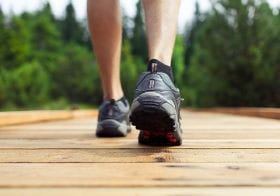By Bob Illingworth, D.C., DACO, Faculty Clinician, Palmer Chiropractic Clinics
 The majority of people will experience back pain, especially in the low back, at some point in their lives. There are many simple ways to help alleviate the problem, and a number of them may help your overall health, too. You may experience some mild soreness in the muscles, but that should fade. If there is an increase in pain intensity or radiation of pain down the leg(s) is experienced, a health professional should be sought out.
The majority of people will experience back pain, especially in the low back, at some point in their lives. There are many simple ways to help alleviate the problem, and a number of them may help your overall health, too. You may experience some mild soreness in the muscles, but that should fade. If there is an increase in pain intensity or radiation of pain down the leg(s) is experienced, a health professional should be sought out.
The following techniques may not only increase your fitness and strengthen your core muscles, but also help diminish back pain.
- Stay close to home when starting out with a walking program. Start by walking laps around the block. Then if discomfort becomes too great, you’re not too far away from home. If you walk on a bike path, go for shorter distances out-and-back, and then out-and-back the other way, so as not to be too far from your starting point.
- When having to stand for long periods without movement, if possible, place one foot up on short box. Alternate which foot is on the box.
- When brushing your teeth, applying make-up, shaving, etc., press a knee against the vanity to gain a little support and be aware of your slumped posture.
- Make homemade weights of varying sizes by putting water in milk jugs, water bottles, etc., for use as dumbbells. The amount of water can vary to give different weights.
- Exercise balls are inexpensive and can help develop and maintain core strength, which is crucial for low back stability. You can even watch TV or work on the computer while sitting on an exercise ball.
Upper back pain may sometimes be caused by a forward head carriage, which, in turn causes tight pectoralis muscles. If your pecs are very tender to pressure and your head feels like it is positioned in front of your chest, doing pectoralis stretching can help. Many of us have a forward head-carriage/slouching when working on computers, driving, reading, etc. Watching your posture when doing these activities can also help.
Back braces can help support weak muscles when you’re active or performing tasks, but they shouldn’t be worn when sleeping or when you’re idle for long periods. This can make the problem worse as the muscles rely on the brace too much and become weaker.
Other tips to help chronically tight muscles include:
- Drinking plenty of water
- Gentle stretching
- Applying heat or ice
Chiropractors are some of the best health professionals for treating back pain. Your doctor at the Palmer Chiropractic Clinics can recommend, guide and follow-up with any exercise and stretching advice given. Getting your spine checked by a chiropractor and following these simple tips can help you be in control of your spinal health.
The Palmer Chiropractic Clinics provide safe, effective, affordable chiropractic care to approximately 170,000 patients each year. Learn more at palmer.edu/clinics.
Read more articles written by Palmer Clinic Faculty.

